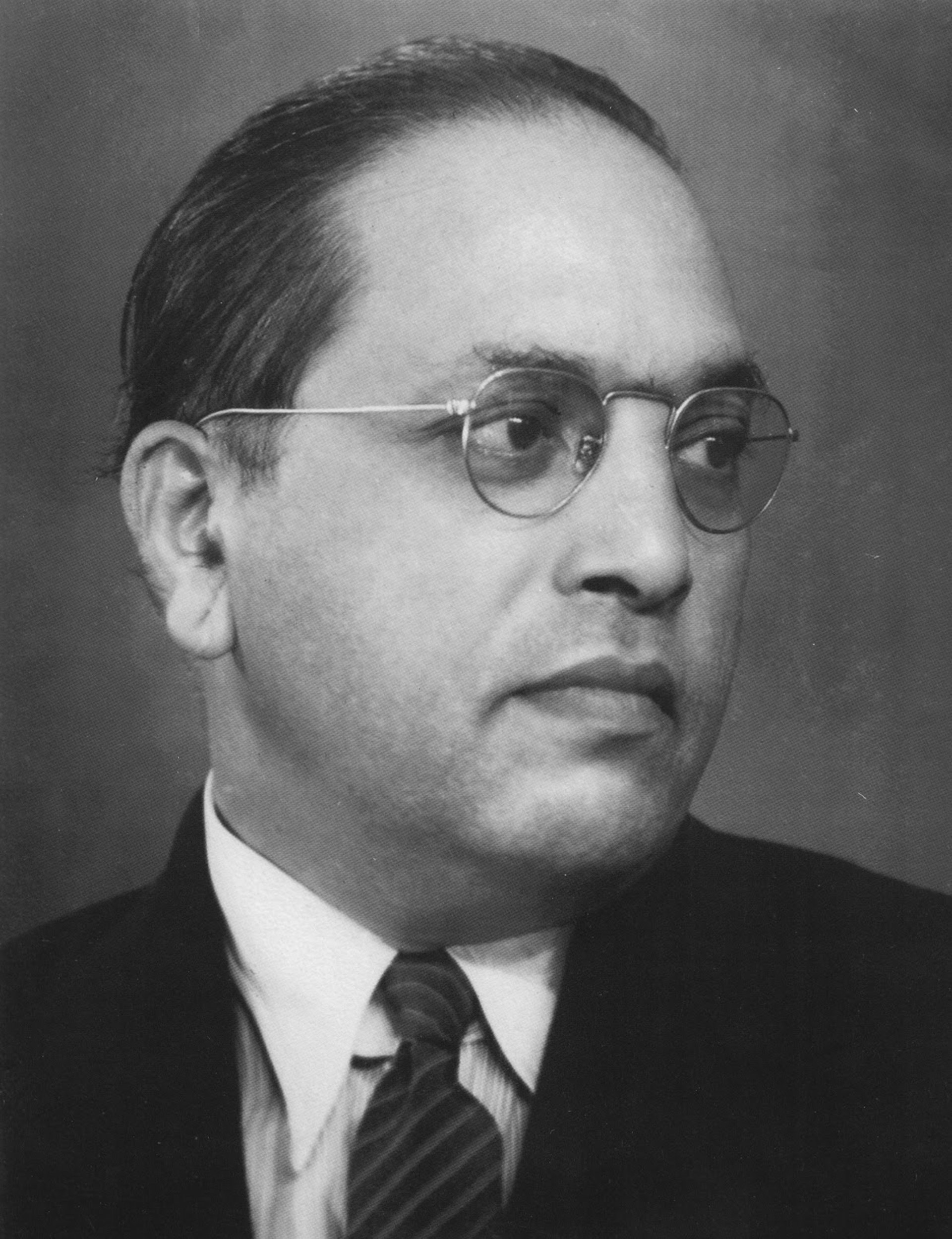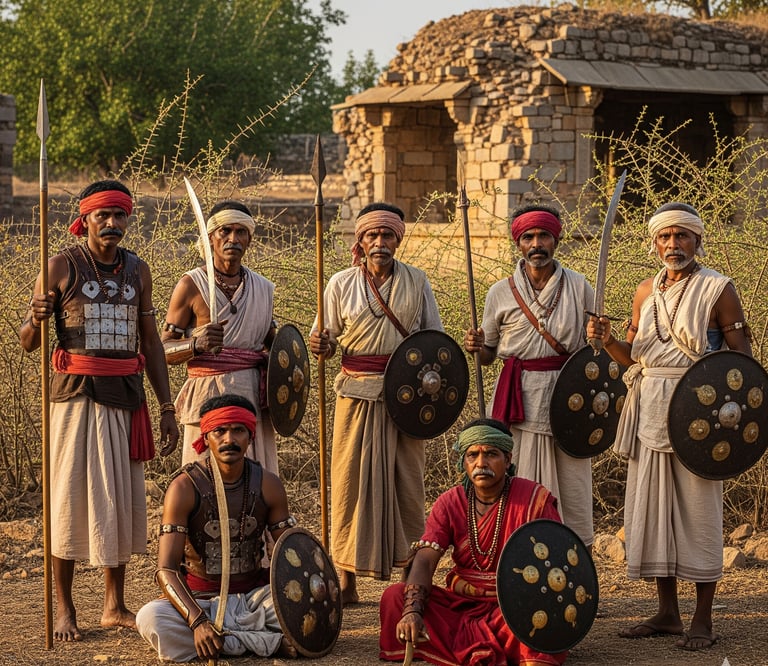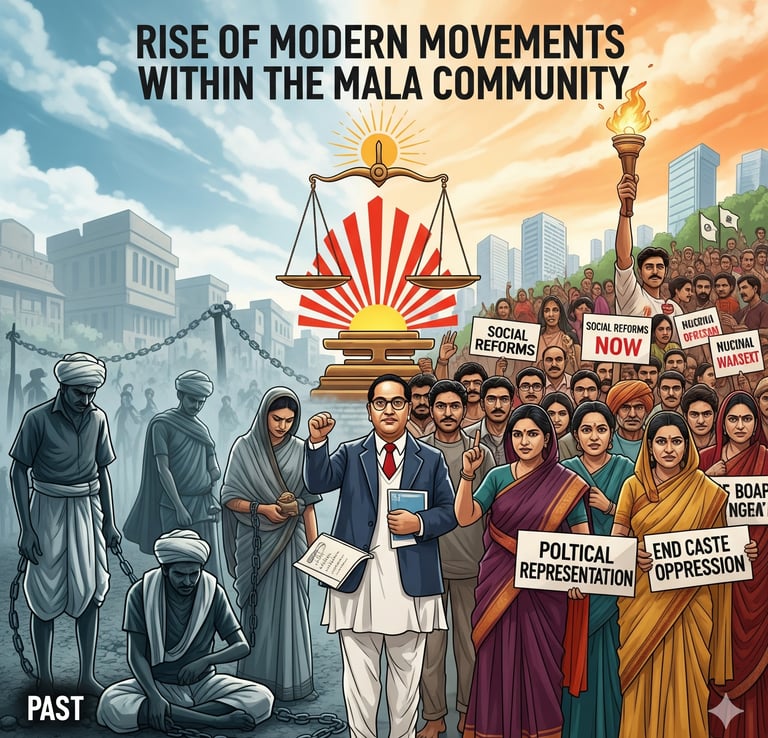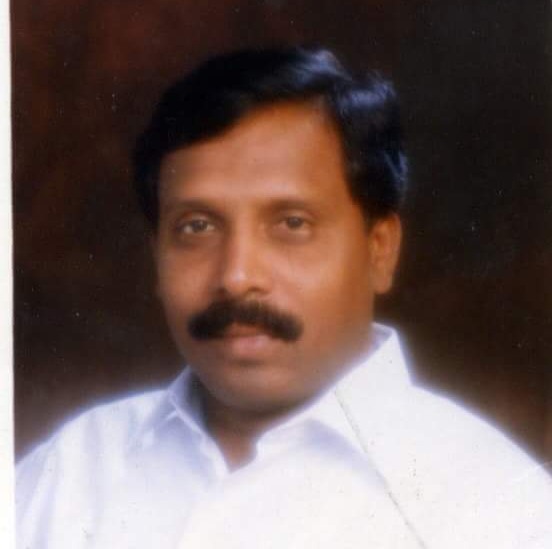
Community Insights


A Warrior Past and Mala Community Status


The Rise of Modern Movements
The Mala community, though now classified as a Scheduled Caste and historically known for roles as agricultural workers and village servants, is believed by some to have a warrior past. Historical accounts suggest that they may have been a martial group before being socially and economically marginalized and relegated to these other occupations


Opposition to SC-Categorization
HISTORY
Shri Nara Chandra Babu Naidu during the period 1996-97 appointed Justice Ramachandra Raju Commission to study Categorisation among scheduled castes and later came out with A.P.Scheduled Castes(Rationalisation of Reservation) Act, 2000 categorizing the 15% SC Reservation Quota into four subgroups A, B, C, D (C-Malas, B-Madigas). The Sub-categorisation policy was implemented for a period of four years (2000–2004). The Sub-Categorisation was first challenged by {main petitioner WPNO.11472/97} UNITED FORUM OF ALL SCHEDULED CASTES, represented by its State General Secretary, DV Srinivas (Present DIRECTOR, AMBEDKAR STUDY CIRCLE, SR NAGAR, HYDERABAD-38, 9397677681)and Dr.EV Chinnayya in WPNo.21096/1996 mainly Challenged the Justice Ramachandra Raju Commission validity under the constitutional provisions.
On SC’s categorisation National Commission for SC,ST,` New Delhi, called for discussions and fact findings were held from 7-7-1998 to 15-7-1998. At that time renowned and eminent Sr Parliamentarian Shri H Hanumanthappa (Sr.Advocate in Supreme Court) was the Chairman and Shri Bommidala Yadaiah (Telengana Mala) was also a Member in the National SC,ST Commission. On 7-7-1998 ShriManda Krishna hearings were noted by the commission on behalf of MRPS(Madiaga Reservation Porata Samithi) and Madiga Community.
On 9-7-98 the National commission for SC,ST has officially invited Shri DV Srinivas,State General Secretary,UFASC,AP, as he was the main petitioner in the case to present his case on behalf of the MALA community. 0n 10th July 1998 Shri Mallela Venkata Rao another leader in Malamahanadu and on 11th July 1998 Shri PV RAO, President, Mala Mahanadu gave the stand on categorisation.
A.P.Scheduled Castes(Rationalisation of Reservation) Act, 2000 was vehemantly opposed by malas and Mala Mahanadu has challenged the Act in Supreme Court saying that it is against the Constitutional principles, which viewed SC’s as a holistic single social group. Supreme Court on 5 Nov 2005 has struck down the Act and the verdict went in favour of Mala Mahanadu. ” The apex court pronounced its Judgement stating that State Government has no power to sub-categorize Scheduled castes into groups to implement reservations in the field of education and employment in exercise of its power under Article 15(4) and 16(4) of Indian constitution as public employment and education.” Further it was held that the parliament alone is competent to pass such an act under the article 341 of Indian constitution.
The Mala community opposes the sub-categorization of Scheduled Castes on four main grounds, as presented in the provided text.
Rationale Behind Opposition
It Harms the Most Vulnerable: The Malas argue that not all members of their community have benefited from affirmative action. They believe that categorization would negatively impact the poor, landless, and uneducated Malas who are still below the poverty line, and that the government should address their economic needs first.
It's Against Constitutional Principles: They assert that sub-categorization is unconstitutional because the Constitution views Scheduled Castes as a single, holistic social group. They also believe it goes against the core ideologies of Dr. B.R. Ambedkar, who advocated for the unity of all Dalits to achieve political and social empowerment.
It Ignores Historical Advantage: The Malas contend that any difference in development between the communities is due to historical factors. Malas in coastal Andhra gained early access to education and employment from Christian missionaries during British rule, while Madigas, largely in Telangana, did not have the same access.
It Divides the Dalit Community: Finally, they believe that categorization weakens the Dalit movement by creating internal divisions and diverting attention from other important issues and constitutional provisions meant to benefit the entire community.
Based on the provided text, the Mala community is undergoing a significant transformation, marked by social mobility, educational determination, and a strong attachment to the work of Dr. B.R. Ambedkar.
Social and Economic Conditions
While many Malas still live in segregated settlements in rural areas, an increasing number of unskilled farm laborers are migrating to urban centers. The community views education as the key to progress, and despite financial struggles, particularly among the poor, their women are showing great determination to get educated. Affirmative action programs and educational institutions have helped many to rise, with some joining the bureaucracy and a few becoming small-scale farmers.
Religious and Political Affiliations
The Mala community is traditionally associated with the Congress Party, which has roots in their historical employment on the landholdings of the Reddis. A significant portion of the community converted to Christianity in the 19th century due to the work of missionaries. These conversions led to the establishment of educational institutions that enabled Christian Malas to secure gainful employment and improve their social position, with many now being part of the upper-middle class.
Influence of Dr. Ambedkar
The community is deeply attached to the work of Dr. B.R. Ambedkar. His statues are a common sight in Mala settlements in villages, serving as a symbol of their commitment to his ideals of social justice and empowerment. In both Andhra Pradesh and Maharashtra, the Mala community is described as rapidly advancing, with many members achieving excellence in various fields.
This deeply entrenched system of social and economic discrimination eventually fueled a strong political and social awakening. In the 20th century, the community became a central part of the broader Dalit movement. Inspired by leaders like B.R. Ambedkar, they began to organize and demand social reforms, political representation, and an end to caste-based oppression. This mobilization led to the formation of political organizations and was a key factor in their official classification as a Scheduled Caste, granting them access to affirmative action policies
Pothula Vigneswara Rao was a Dalit social activist who also worked as an Editor in the Information and Public Relations Department of the Andhra Pradesh government.
He was dismissed from his service for opposing the government's policies, which led him to found the Mala Mahanadu.
Mala Mahanadu Movement.
He founded the Mala Mahanadu in 1986 to fight against the Andhra Pradesh government's decision to sub-categorize Scheduled Castes (SC) for reservation benefits. The government's policy aimed to divide the SC population into four groups, which would have limited the share of reservations for the Mala community. Rao and the Mala Mahanadu contested this policy, and their long struggle culminated in a landmark Supreme Court verdict in their favor in 2004, which quashed the state's legislation. The movement has also consistently advocated for unity between the Mala and Madiga communities.
